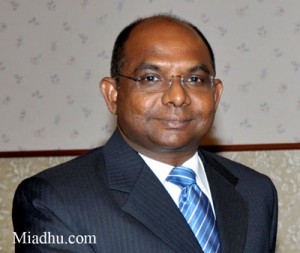The silent speaker: what role Shahid?
Abdulla Shahid, the speaker of parliament, is pivotal to Maldivian politics. As head of one of the three separate powers that govern us, his actions are of equal importance to those of the Executive and the judiciary. Yet he has remained largely silent through the current crisis, seemingly not in possession of any opinion whatsoever on the matter. Is his silence meant to convey neutrality? Does it?
Abdulla Shahid, by all accounts a sharp, charming and witty man, appeared wholly unflustered by the sudden resignation of President Mohamed Nasheed. It was as if he dealt with change of presidents every day. He was there to receive the letter, which Mohamed Nasheed says he was forced to write. He did not question its validity, despite the wrongful manner in which it was dispatched to him.
He arranged for Dr Mohamed Waheed Hassan Manik to take the presidential oath, replacing Nasheed with Waheed within the hour. He presided over the administering of an oath, which did not include Dr Waheed’s name, an omission that side-stepped the Constitution. Why?
Twice he presided over the Majlis when Dr Waheed sat down to make his inaugural address to the Majlis. Both times the presidential flag was missing. Why?
He kept the Majlis open despite the fracas which led to the eviction of several Members who opposed Dr Waheed’s presence and address. Whatever happened, he ensured the Majlis session that day lasted long enough for Waheed to make his speech. Why is he so keen to establish the legitimacy of this government? Is it for the good of the country?
Silent in the JSC
The links between Abdulla Shahid and the change of government are related to the links between the judiciary and the parliament. Abdulla Shahid is on the Judicial Service Commission, the independent commission at the centre of the political crisis that currently engulfs the country.
Shahid’s position as Speaker of Parliament, and his status in Maldivian society as the grandson of Mohamed Jameel—one of the country’s most respected late scholars—with his background as Minister of State for Presidential Affairs in Gayoom’s regime combine to give him huge political clout within the movers and shakers in Maldivian politics.
Within the Judicial Service Commission, where members are meant to be equal, Shahid received deferential treatment. Members such as Dr Afraasheem and other Gayoom loyalists would often wait for Shahid to arrive before taking a vote. When controversies surround the Judicial Service Commission, and when controversial decisions are made within it,Abdulla Shahid does not take part but plays the role of a peacemaker.
Why, as the Speaker of our Majlis, and as a member of the JSC did he remain silent when it decided to dismiss Article 285 of the Constitution as ‘symbolic’? Why did he not raise the matter in the Majlis?
Silent in the Majlis
Today the Speaker says he regrets MDP MP’s behaviour in the Majlis, describing it as a matter of great shame. He compared the MDP MPs’ protests to the 2010 Ukrainian parliamentary protests when the Speaker had to take cover behind an umbrella to save himself from rotten eggs. He seemed to suggest that parliamentary obstruction, a part of democracy—no matter how unappealing—since the 1800s, was something only MDP MPs and uncouth Ukrainians would stoop to.
Would the Maldivian democracy have survived better if we had a Speaker more willing to stand up for it, even if he were not actively engaged in bringing it down?

One comment